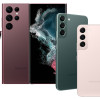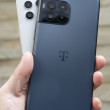Review: Huawei Honor 8
The Honor 8 from Huawei is a very good phone, but stops short of being excellent. A few hardware and software issues prevent the Honor 8 from living up to its full potential.
Huawei did a fine job crafting an attractive, high-quality piece of hardware. The glass-and-metal design is stunning. Some buyers may appreciate the phone's smaller footprint when compared to the competition, but the screen is a bit smaller and has fewer pixels. Battery life is excellent. I found the Honor 8 to fall below average in terms of compatibility with AT&T's network, with dropped calls and some stuttering data performance. Voice calls are louder than most competing devices, which is a bonus.
On the software side, Huawei's Emotion UI is polished and pretty, but usability suffers thanks to overly-convoluted menus and a lack of basic tools like access to the notification shade on the lock screen. Emotion UI does offer a lot of room for customization. The camera app is powerful, though some may dislike the inconsistent interface elements. At least it takes good pictures.
The Honor 8, OnePlus 3, Axon 7, and Idol 4s all cost $399 and are sold unlocked. Each is well-made, includes good specs, and fine performance. Deciding between these four handsets is a tough call. I think the deciding factor for many here will likely boil down to size. The Honor 8 is smaller and easier to use than the other three, but the competing phones have bigger, better screens.
You can't really go wrong with any of these handsets. The $399 price point and high-quality hardware make the Galaxy S7 and iPhone 7 look stupidly expensive in comparison. The Honor 8 wouldn't be my first choice, but that's only because I prefer larger phones. If you dislike large handsets and want a more compact, quality phone, the Honor 8 is a fine first choice.



 Hands On with the Honor 8
Hands On with the Honor 8
 Huawei's Honor 8 to See Nougat In February
Huawei's Honor 8 to See Nougat In February
 Huawei Pushes Honor Brand Uprange with Flagship Honor 8
Huawei Pushes Honor Brand Uprange with Flagship Honor 8
 Samsung Refreshes Galaxy S Series with S Pen, New Cameras
Samsung Refreshes Galaxy S Series with S Pen, New Cameras
 iPhone 14 Plus Offers a Big Screen For Less
iPhone 14 Plus Offers a Big Screen For Less
 Huawei Honor 8
Huawei Honor 8



